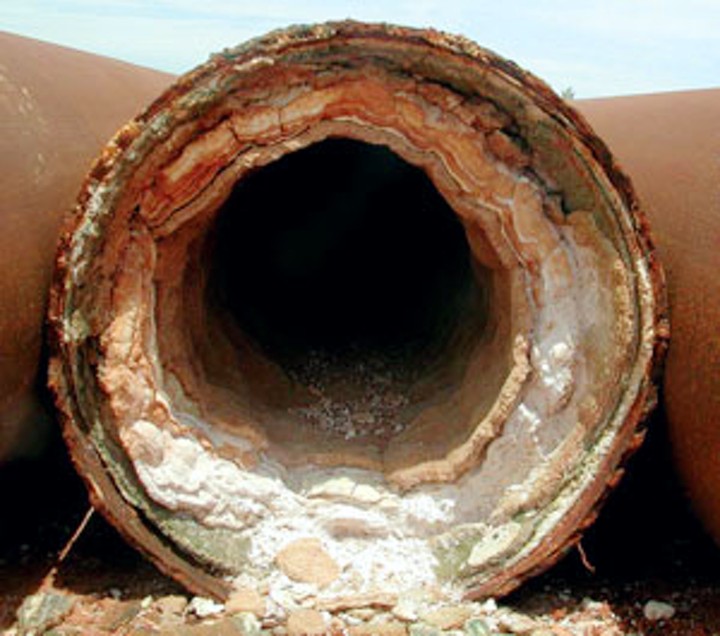Overview
Water Scale is a coating that is present on the surfaces in contact with hard water. Water containing carbonates or bicarbonates of calcium or magnesium is most likely to cause Scaling. Scaling is a destroyer of industry growth and directly affects plant and equipment, service, and profitability. It’s a well-known fact to any plant engineer or maintenance department that the Scale ruins the entire system due to the slow and silent instinct of nature.
Most of the water scale formations are hard and very difficult to clean up. Since this forms a coating, it can have a significant influence on thermo-transfer and reduce fluid flow. Scale often takes up space within the pipes and can reduce the flow rate and efficiency of the system. The system must now work harder to move energy across this Scale. Furthermore, the added corrosion inhibitors can no longer adsorb to the system’s metallurgy, likely leading to under-deposit corrosion and system damage.
We are one of India’s leading chemical suppliers. At Jateen Trading Co., we strive to not only meet the customer’s expectations but also to exceed them. We offer a better experience and also high-quality service in preventing and reducing Scaling.
How is the Scale caused?
Dissolved calcium and magnesium salts are responsible for the bulk of Scaling. Long-term movement of hard water through a pipe will lead to scale build-up. Moreover, scale formation depends on two factors, one of which is temperature and the other pH. As the temperature of the water in the cooling system increases, this causes the formation of a scale on the heat transfer surfaces.
In simple terms, Scale is due to the precipitation of calcium carbonate, which is insoluble at higher temperatures. When the water is heated, scale minerals precipitate layers of rocky deposits inside pipes, water heaters, equipment, etc. Water Scale deposits interact with the heat exchangers and reduce their performance by isolating the heat transfer surfaces. Boiler or cooling equipment is often getting affected by this exceptional Scale. The table below shows how it impacts energy consumption.
TABLE SHOWING INCREASE OF FUEL IN BOILERS DUE TO SCALE
| Thickness of Scale | Increase in Fuel consumption due to Scale |
| 1/2 Mm | 2% |
| 1 Mm | 4% |
| 2 Mm | 6% |
| 4 mm (1/4”) | 10% |
| 8 mm (1/4”) | 20% |
| 16 mm (1/2”) | 40% |
| 30 mm (1”) | 80% |
Moreover, scaling damages heat exchangers and other devices to minimize performance and increase the energy bill for high prices.
How can we prevent Scaling?
Scale deposition control is an important component of any effective program of cooling water treatment. Ion exchange softeners can remove water hardness. Chemical addition may also increase the hardness capacity and reduce its adhesive properties. This enables higher concentration cycles to be achieved with less deposition. Scale deposition control techniques have to be used to keep these devices running longer.
Some methods we use to reduce Scaling:
Planned Water Treatment: The industry needs a planned water treatment to get rid of the problem mentioned above. Planned water treatment means a thorough survey of the system before any chemical treatment. The survey includes its design, construction material, operating temperature, analysis of make-up water, present condition of Boiler & Cooling tower in respect of Scaling & Corrosion followed by proper monitoring of water parameters recommended by the water treatment company.
Sludge Conditioners: Phosphate treatment programs precipitate the calcium and magnesium hardness of the boiler water in the form of hydroxyapatite and serpentine. These compounds form sludge. For preventing Scale, we often use sludge either blended in the solution or as supplements to avoid the development of scales and deposits on heat transfer surfaces.
Water Softening System: One of the most reliable of these is investing in a water-softening system. This eliminates ions dissolved in water that trigger hard water, calcium, and magnesium as hard water damages the pipes and appliances. They also prevent soaps and detergents from harming your pipes, thus you can find this system worthwhile.
Boiler Treatment: Boiler water chemical treatment is important to avoid or monitor the formation of scales and deposits. Technically sophisticated water-scale boiler control inhibitors are also scientifically designed to counteract the adverse effects of scale build-up.
We here at Jateen Trading Co. uses the above sludge condition and all the scale preventive measures for giving the best experience to our customers. We have been one of the most renowned chemical suppliers, along with one of India’s fastest-growing chemical suppliers.
Conclusion
In conclusion, the management of Scale is a long-term or ongoing process. It needs to be treated with appropriate care. It could only be possible by direct supervision by professionals with advanced technology & international standard goods. Without scale control, the scale build-up will continue to become heavier and more difficult to eliminate overtime. Hence, more money is needed for expensive repairs or for replacements. We use all the preventive measures and sludge conditioners to prevent or reduce Scaling.
We, at Jateen Trading Co., ensure to provide you a clean and safe Scale-free operation. Our experts can help you assess the opportunities for maximizing the performance and reliability of your water systems. We prevent the build-up of scales and hard water stains when mounted on new systems and progressively remove scales.

